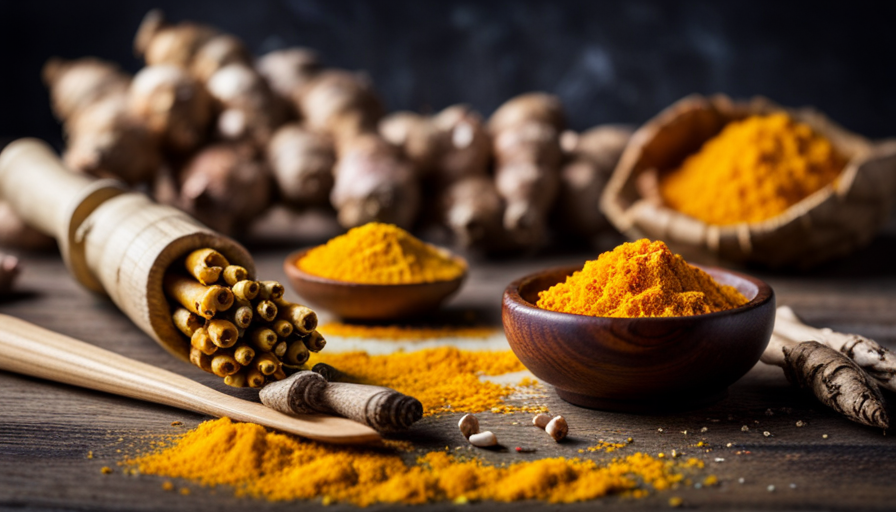Welcome to the world of turmeric tea, where ancient wisdom combines with modern health practices. Turmeric, or the ‘golden spice,’ has a long history of use in Ayurvedic and traditional Chinese medicine for its anti-inflammatory and antioxidant properties.
Turmeric tea, made from the root of the turmeric plant, has become increasingly popular in recent years due to its potential health benefits. You may be wondering why turmeric tea is worth incorporating into your daily routine. The answer lies in the many health benefits associated with turmeric.
From reducing inflammation to aiding in weight loss, turmeric tea has been linked to a variety of positive health outcomes. In this article, we will explore the history, nutritional benefits, and science behind turmeric tea, as well as its potential to prevent chronic diseases and improve overall well-being.
So, grab a mug and join us as we explore the many reasons why turmeric tea should have a place in your daily routine.
Key Takeaways
- Turmeric tea is a popular beverage with potential health benefits, including reducing inflammation, aiding in weight loss, and improving brain function.
- It contains curcuminoids, which act as powerful antioxidants and may help prevent chronic diseases like heart disease, cancer, and Alzheimer’s disease.
- Turmeric tea can be flavored with ginger, cinnamon, or cardamom, and sweetened with honey and lemon.
- While excessive intake may cause stomach upset, nausea, and diarrhea, turmeric tea can be used for skincare due to its anti-inflammatory and antioxidant properties.
Overview of Turmeric and its Health Benefits
You may be interested to know that turmeric, with its potent anti-inflammatory and antioxidant properties, has been linked to numerous health benefits.
Turmeric is a spice that has been used for centuries in traditional medicine for its ability to reduce inflammation, improve brain function, and even prevent cancer. In recent years, turmeric supplements and turmeric recipes have become increasingly popular, as people look for natural ways to improve their health and wellbeing.
One of the key benefits of turmeric is its anti-inflammatory properties. Chronic inflammation is a major risk factor for many diseases, including heart disease, cancer, and Alzheimer’s. Turmeric contains compounds called curcuminoids, which have been shown to reduce inflammation in the body.
In addition, turmeric is a powerful antioxidant, which means it can help protect against damage caused by free radicals. All of these benefits make turmeric a great addition to your diet, whether you choose to take it in supplement form or incorporate it into your meals.
And if you’re looking for a delicious way to enjoy turmeric, turmeric tea is a great option!
History of Turmeric Tea
Centuries ago, people in Southeast Asia discovered the incredible health benefits of turmeric, a bright yellow spice with medicinal properties. Turmeric has been used in traditional medicine for thousands of years and was believed to aid in digestion and promote overall wellness. The use of turmeric in teas dates back to ancient Ayurvedic practices.
Turmeric tea has become a staple in many cultures, including Indian, Persian, and Indonesian. Its rich history and cultural significance reveal the deep-rooted importance of turmeric in traditional medicine. The spice was used to treat inflammation, digestive issues, and skin conditions. Turmeric was also a symbol of prosperity and good luck in many cultures.
Today, turmeric tea is beloved for its delicious taste and health benefits. In the next section, we’ll explore how to make turmeric tea at home.
How to Make Turmeric Tea
To make turmeric tea, you’ll need a few key ingredients. Start with fresh turmeric root or ground turmeric powder. Then add water, black pepper, and your preferred sweetener, such as honey or maple syrup.
The preparation process involves simmering the ingredients together for about 10 minutes. Then, strain the liquid and serve hot.
For flavor variations, try adding ginger, cinnamon, or cardamom for a spicier taste. Or, add lemon or orange juice for a citrusy kick.
Ingredients
If you’re looking for a warm and soothing beverage, consider brewing a cup of turmeric tea with just a few simple ingredients. Turmeric tea has been used for centuries in Ayurvedic medicine for its numerous health benefits.
Here are some key ingredients that make this tea a great choice:
- Turmeric: The star ingredient of this tea, turmeric contains a powerful compound called curcumin, which has anti-inflammatory and antioxidant properties. It may help reduce the risk of chronic diseases like heart disease, diabetes, and cancer.
- Ginger: Another anti-inflammatory ingredient, ginger adds a spicy kick to the tea and may also help relieve nausea and digestive issues.
- Black pepper: Adding a pinch of black pepper to the tea can enhance the absorption of curcumin in the body, making it more effective.
With just these three simple ingredients, you can brew a delicious and nutritious cup of turmeric tea.
In the next section, we’ll show you how to prepare it for maximum benefits.
Preparation
Start steeping your spicy and soothing brew with simplicity and a splash of sweetness. Brewing turmeric tea is a simple process that involves a few key steps. To make the perfect cup of turmeric tea, follow these tips for brewing and best brewing practices.
First, bring water to a boil in a small pot or kettle. While the water is heating up, prepare the ingredients by grating fresh turmeric root and ginger. Add the grated turmeric and ginger to the water, as well as any additional ingredients such as honey or lemon. Allow the mixture to steep for at least 10 minutes, stirring occasionally. Once the tea has steeped, strain it into a cup and enjoy!
| Tips for Brewing | Best Brewing Practices |
|---|---|
| Use fresh turmeric and ginger for maximum flavor | Boil water before adding ingredients |
| Steep for at least 10 minutes to allow flavors to infuse | Stir occasionally while steeping |
| Strain tea before serving to avoid any unwanted bits | Add honey or lemon for a splash of sweetness |
Turmeric tea is a delicious and healthy beverage that can be enjoyed in a variety of ways. Now that you know the best brewing practices, it’s time to explore the many flavor variations that can be used to make this tea even more delicious.
Flavor Variations
Now that you know how to prepare turmeric tea, let’s talk about how you can spice up its flavor. While turmeric tea on its own has a slightly bitter taste, adding different ingredients can make it more enjoyable.
One popular way to sweeten turmeric tea is by adding honey and lemon. The honey adds a natural sweetness that complements the bitter taste of turmeric, while the lemon gives it a tangy flavor. If you prefer a spicier taste, you can add ginger and cinnamon to your turmeric tea. Ginger has anti-inflammatory properties and can help soothe an upset stomach, while cinnamon adds a warm and comforting flavor.
These flavor variations not only add taste to your turmeric tea, but they also come with their own health benefits. Honey has antibacterial properties and can help soothe a sore throat, while lemon is high in vitamin C and can boost your immune system. Ginger can help reduce inflammation and nausea, while cinnamon can improve blood sugar control.
Experimenting with different flavors can help you find the perfect turmeric tea recipe that suits your taste buds and health needs. Now, let’s take a look at the nutritional benefits of turmeric tea.
Nutritional Benefits of Turmeric Tea
Get ready to indulge in the numerous nutritional benefits of turmeric tea. It can improve brain function, reduce inflammation, and boost immunity. Turmeric tea aids in digestion by stimulating the gallbladder to produce bile, which helps break down fats. It also helps with bloating, gas, and constipation.
The anti-inflammatory properties in turmeric can reduce inflammation in the gut, which can prevent ulcers and other digestive issues. In addition to its digestive benefits, turmeric tea can also boost your immune system. Curcumin, the active ingredient in turmeric, has powerful antioxidant and anti-inflammatory effects that protect the body against disease and infections.
Studies have shown that curcumin can improve brain function by increasing levels of brain-derived neurotrophic factor (BDNF), a hormone that promotes the growth of new brain cells. So, sip on a cup of turmeric tea daily to reap these amazing health benefits.
Health Benefits of Turmeric Tea
Indulging in a daily cup of this golden elixir can provide numerous health benefits, from boosting brain function to reducing inflammation and aiding digestion. Here are four ways that turmeric tea can benefit your health:
-
Digestive benefits: Turmeric tea has been shown to alleviate symptoms of indigestion and bloating. It can also stimulate the production of bile in the liver, helping to break down fats and aid in digestion.
-
Immune system boost: Turmeric contains curcumin, which has powerful anti-inflammatory and antioxidant properties. Drinking turmeric tea regularly may help to strengthen the immune system and reduce the risk of infections.
-
Anti-inflammatory properties: Chronic inflammation is linked to many diseases, including arthritis, heart disease, and cancer. Curcumin in turmeric tea has been shown to have potent anti-inflammatory effects, which may help to reduce the risk of developing these chronic diseases.
-
Brain health: Curcumin in turmeric tea has been shown to increase levels of brain-derived neurotrophic factor (BDNF), a protein that’s important for brain function and may help to prevent neurodegenerative diseases such as Alzheimer’s.
Now that you know some of the ways that turmeric tea can benefit your health, let’s explore how it can help with chronic diseases.
Turmeric Tea and Chronic Diseases
If you’re looking for a natural way to combat chronic diseases, turmeric tea may be worth exploring.
Studies have shown that the curcumin in turmeric has anti-inflammatory properties that can reduce the risk of heart disease.
There is evidence that turmeric can potentially play a role in the prevention and treatment of cancer and Alzheimer’s disease.
Heart Disease
You can easily incorporate turmeric tea into your daily routine to potentially lower your risk of heart disease, while also enjoying its warm and soothing flavor. Heart disease is a leading cause of death worldwide, and prevention methods such as lifestyle changes are crucial in reducing the risk of developing this condition.
Studies have shown that curcumin, the active ingredient in turmeric, has anti-inflammatory and antioxidant properties that may help improve heart health by reducing inflammation and oxidative stress in the body. In addition to incorporating turmeric tea into your daily routine, other lifestyle changes that may help reduce the risk of heart disease include regular exercise, maintaining a healthy weight, and eating a balanced diet low in saturated and trans fats.
By making these simple changes, you can potentially improve your heart health and reduce your risk of developing heart disease. Next, we’ll explore how turmeric tea may also have benefits in reducing the risk of cancer.
Cancer
One way to potentially reduce your risk of cancer is by incorporating turmeric into your diet. Turmeric contains a compound called curcumin, which has been shown to have anti-cancer properties. Studies have found that curcumin can inhibit the growth of cancer cells and even induce cancer cell death.
In addition to cancer prevention, curcumin may also be a valuable treatment option for those already diagnosed with cancer. Research has shown that curcumin can enhance the effects of chemotherapy and radiation therapy, while also reducing the side effects of these treatments. It’s important to note that while turmeric and curcumin may have potential health benefits, they shouldn’t be used as a replacement for conventional cancer treatments.
As we move into the subsequent section about Alzheimer’s disease, it’s important to note that turmeric may also have benefits for brain health.
Alzheimer’s Disease
Did you know that Alzheimer’s disease affects over 5 million Americans and is projected to double by 2050? This debilitating disease not only affects the individual, but also their loved ones who are left to care for them. Although there is no cure for Alzheimer’s disease, prevention strategies and early detection can significantly improve the quality of life for those affected.
Prevention strategies for Alzheimer’s disease include maintaining a healthy lifestyle, such as regular exercise, a balanced diet, and not smoking. Additionally, engaging in mentally stimulating activities, such as reading, puzzles, and socializing, can also help prevent cognitive decline. Early detection is also crucial in managing Alzheimer’s disease. This includes visiting a doctor for regular check-ups and reporting any changes in memory or cognitive function. With early detection, individuals can receive proper treatment and support, which can significantly improve their quality of life.
Now, let’s move on to the next topic of turmeric tea and weight loss.
Turmeric Tea and Weight Loss
When trying to shed some extra pounds, adding turmeric tea to your daily routine can be a delicious and natural way to support weight loss efforts. Turmeric tea has been found to have metabolism-boosting properties that can aid in weight loss.
Curcumin, the active ingredient in turmeric, has been shown to increase metabolism and improve insulin sensitivity, both of which can contribute to weight loss. In addition, turmeric tea’s anti-inflammatory properties can also support weight loss efforts.
Chronic inflammation can lead to weight gain, so consuming anti-inflammatory foods and drinks like turmeric tea can help reduce inflammation in the body and potentially aid in weight loss. However, it’s important to note that while turmeric tea can be a helpful addition to a weight loss routine, it’s not a magic solution and should be paired with a healthy diet and exercise.
Precautions and Side Effects
Before incorporating turmeric tea into your daily routine, it’s important to be aware of potential side effects and take necessary precautions. While turmeric is generally safe for consumption, excessive intake may cause stomach upset, nausea, and diarrhea. It may also interact with certain medications, such as blood thinners, and increase the risk of bleeding.
If you’re taking any prescription medications, it’s best to consult with your healthcare provider before consuming turmeric tea on a regular basis. It’s also important to note that pregnant and breastfeeding women should exercise caution when consuming turmeric tea. Although turmeric is generally considered safe during pregnancy and breastfeeding, there is limited research on its effects on maternal and fetal health.
It’s best to consult with your healthcare provider before incorporating turmeric tea into your diet if you are pregnant or breastfeeding. With that said, let’s explore other uses for turmeric.
Other Uses for Turmeric
Now that you’re aware of the precautions and side effects of turmeric tea, let’s explore other uses for turmeric.
Did you know that turmeric can be used for skincare? It’s true! Turmeric has anti-inflammatory and antioxidant properties that can help soothe and brighten the skin.
You can mix turmeric with honey and yogurt to create a DIY face mask or add a pinch of turmeric to your daily moisturizer for an added boost.
Turmeric is also a popular spice in cooking, especially in Indian and Middle Eastern cuisine. It adds a warm, earthy flavor to dishes and can be used in both sweet and savory recipes.
Try adding turmeric to your scrambled eggs or roasted vegetables for a delicious and healthy twist. With its numerous health benefits and versatility in the kitchen and beauty routine, turmeric is a spice worth incorporating into your daily life.
Frequently Asked Questions
Can turmeric tea be consumed during pregnancy?
You may want to avoid turmeric tea during pregnancy due to potential risks. However, studies suggest it may provide benefits such as reducing inflammation. Check with your doctor and consider trying safe turmeric tea recipes. Benefits and Risks: Exploring Turmeric Tea During Pregnancy, Turmeric Tea Recipes: Delicious and Nutritious Options for Expecting Mothers.
Is it safe to consume turmeric tea if you are on blood thinners?
If you’re on blood thinners, safety concerns arise when consuming turmeric tea due to its natural blood-thinning properties. However, turmeric tea has numerous health benefits, so consult with your doctor to determine if it’s safe for you.
How long should one steep turmeric tea for optimal benefits?
For optimal health benefits, steep turmeric tea for 10-15 minutes. This allows the curcumin, the active ingredient in turmeric, to fully infuse the water. Studies show that consuming turmeric regularly can improve brain function and reduce inflammation.
Can turmeric tea be consumed by children?
Turmeric tea can be a child-friendly recipe as it offers possible health benefits, such as reducing inflammation and aiding digestion. However, it is important to consult with a pediatrician before giving it to children.
Are there any specific types of turmeric that are best for making turmeric tea?
For making turmeric tea, the best turmeric varieties are the ones with high curcumin content. Curcumin has numerous health benefits, including anti-inflammatory and antioxidant properties, making turmeric tea a healthy and flavorful beverage.
Conclusion
So, that’s why turmeric tea is a great addition to your daily routine! By drinking this delicious and nutritious tea, you can reap the many health benefits that turmeric has to offer.
Whether you want to reduce inflammation, boost your immune system, or even lose weight, turmeric tea can help. But, it’s important to remember that while turmeric has many benefits, it can also have some side effects.
As with any supplement or herb, it’s important to talk to your doctor before adding turmeric tea to your diet. And, if you do start drinking turmeric tea, be sure to start with a small amount and gradually increase it over time to avoid any potential stomach upset.
As the saying goes, "an ounce of prevention is worth a pound of cure."By taking the time to learn about turmeric tea and its benefits, you’re taking an important step towards improving your health and well-being.
So, grab a warm cup of turmeric tea and enjoy all the benefits that this amazing herb has to offer!










